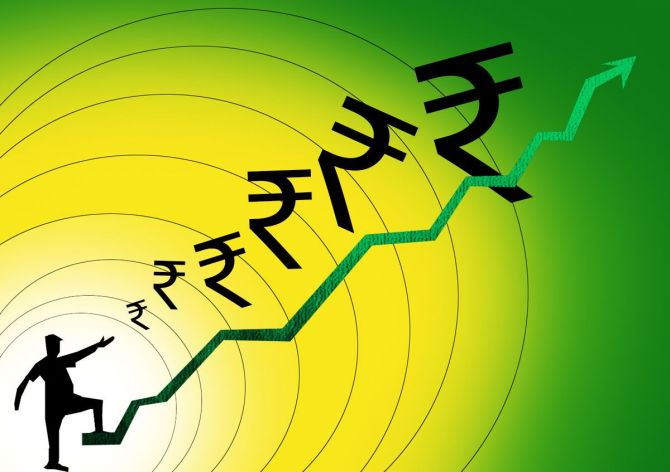The biggest bounce is in the realty sector, where the industry index jumped 80%.
There's been a turnaround also in automobiles and ancillaries (up 45%).
The pharma and health care indices have a welcome return of roughly 35%.

It has been a great 12 months for investors, with India's stock market among the world's best performers.
The benchmark, Nifty 50, which tracks the 50 biggest listed companies, has returned 19.7 per cent since January 2023, while the Nifty 500 has returned 25.7 per cent.
The midcaps and smallcaps have returned nearly 50 per cent.
This gels with generally bullish sentiment since smaller stocks outperform blue chips during a bull run.
Among investor classes, foreign portfolio investors (FPIs) have invested nearly Rs 2 trillion since April 2023 while domestic institutions (including mutual funds) have put in Rs 84,000 crore (Rs 740 billion).
Retail investors have also been positive, as evidenced by the extraordinary returns in smallcaps and microcaps as well as the steady inflows to equity mutual funds.
As always there are differences between returns from various sectors. A look at some of the data may offer clues about investor focus.
It's worth noting that stock markets move more on the basis of anticipated future returns rather than on historical returns.
The biggest bounce is in the realty sector, where the industry index has jumped 80 per cent.
There's been a turnaround also in automobiles and ancillaries (up 45 per cent), led by good volumes in passenger cars, and an improvement in two-wheeler volumes during the festive season.
The pharma and health care indices have a welcome return of roughly 35 per cent.
These two sectors are actually not correlated.
The fortunes of Indian pharma are dependent on exports while health care is moving out of the COVID-19 overhang.
Another big performance has come from public sector banks (PSBs) -- this segment has seen turnarounds and the index of PSBs returned over 32 per cent.
The cleanup of balance sheets in banking has obviously benefited these institutions the most since they had the worst overhang of bad loans.
The fast-moving consumer goods (FMCG) sector has seen a return of 29.5 per cent. Read in conjunction with the bounce in auto shares and, in particular, the rebound in two-wheeler stocks, this indicates optimism about a pickup in rural consumption since two-wheeler volumes and FMCG returns are strongly associated with that.
The IT index has returned a surprisingly decent 23 per cent -- surprising, given consistently cautious and gloomy guidance from managements.
The weak rupee and the surprisingly strong US economy have both been positive factors.
While no sector has given a negative return, oil and gas has underperformed.
High energy prices negatively impacted the oil-marketing companies, while the windfall tax hobbled upstream producers.
Private banks have not received as much attention as their public-sector counterparts -- the private bank index has returned only 11 per cent.
Looking at the economy thematically, the big returns have come in companies with infrastructure exposure (up 40 per cent) and public-sector undertakings (up 75 per cent).
This ties in with the overall thrust of budget allocations.
A bunch of public sector undertakings with defence exposures such as Hindustan Aeronautics, Cochin Shipyard, and Bharat Electronics have done well on the basis of expanded defence budgets and a focus on domestic production.
Looking forward, the realty and auto performances indicate expectations of sustained gains in consumption, while FMCGs have managed to ride out peak inflation.
Election-related spending should also be a useful driver.
However, the rally in infrastructure and related sectors would depend on the government's approach to capital spending after the Lok Sabha elections.
Feature Presentation: Aslam Hunani/Rediff.com











